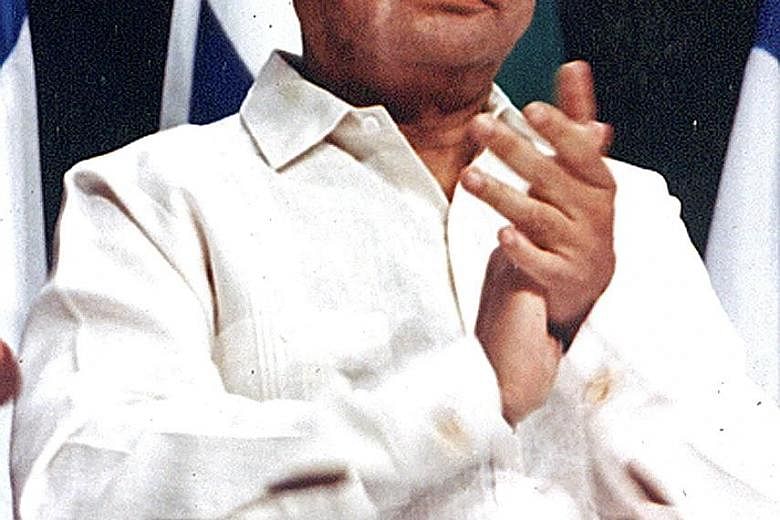PANAMA CITY • Panama's former dictator, Manuel Noriega, died in Panama City late Monday, physically diminished after decades of imprisonment for crimes committed during his 1983-1989 rule.
Noriega, 83, died in Panama City's public Santo Tomas hospital, where he had been recovering from early March surgery to remove a brain tumour, and a subsequent operation to clean up cerebral bleeding.
The announcement of his death was made by government communications secretary Manuel Dominguez.
President Juan Carlos Varela posted on Twitter that Noriega's death "closed a chapter in our history", adding that the family of the former strongman "deserved to bury him in peace".
Noriega had been serving lengthy prison sentences in Panama for murder and forced disappearances during his dictatorship.
He had been granted temporary release on Feb 28 from his prison overlooking the Panama Canal to undergo surgery.
Following years of ill health that included respiratory problems, prostate cancer and depression, his family pleaded with the authorities to let him to serve the rest of his sentence under house arrest.
However, the government rejected their appeals, and said Noriega would return to prison once he recovered from the brain tumour surgery.
Born in 1934 to a poor family, Noriega - nicknamed "pineapple face" for his pock-marked visage - entered Panama's military at a young age and rose through the ranks to become de facto ruler of a country that hosts the strategic Panama Canal in 1983.
During his ascent and time in power, Noriega juggled work for the United States' Central Intelligence Agency along with relationships with Colombian drug lord Pablo Escobar, Cuban leader Fidel Castro, and other foreign intelligence services.
But his increasingly brutal rule and drug dealings led the US to seek his ouster. Noriega was toppled in a December 1989 US military invasion, and surrendered to US troops in January 1990.
The former strongman was flown to the US, where a court there convicted him on drug trafficking and money laundering charges, and sentenced him to prison.
In 2010, Noriega was sent to France, where he was convicted on money laundering charges, then extradited to Panama the following year, where he had been sentenced in absentia to prison for political murders and his role in killing soldiers attempting a coup against him.
Noriega returned home as a wheelchair-bound broken man suffering from a series of ailments. In 2015, he issued a blanket apology "to anybody who felt offended, affected, prejudiced or humiliated by my actions".
AGENCE FRANCE PRESSE

